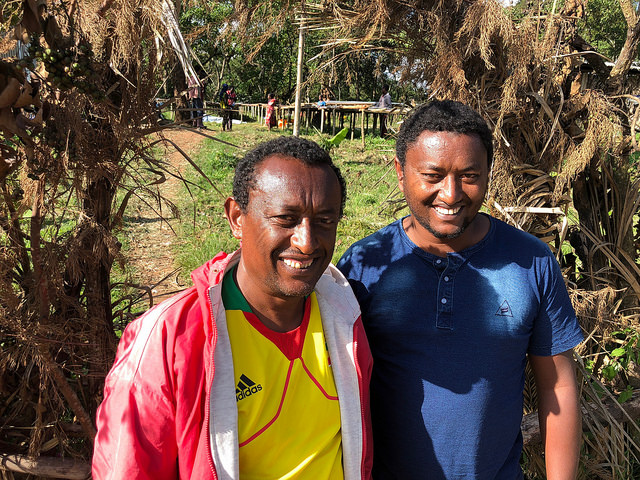Matt and I arrived in Addis at the end of October which is earlier than usual, yet it was perfect timing for what we hoped to achieve: meeting, planning, preparing, receiving and sharing inspiration. We even got to sample a few super fresh coffees right off the drying bed, satisfying our curiosity for the upcoming season.
Political Instability
The political situation in Ethiopia has been uneasy in recent years. The country’s economy is growing, extreme poverty is statistically on the decline, and Addis Abeba is amidst a real estate boom. However the 18 provinces in the countryside are experiencing shakier times. We heard stories of re-appropriation of land, washing stations being burned, and violence aimed at supposedly wealthier individuals. The causes are varied: political, ethnic and economic. Our friends and partners in Ethiopia discouraged us from traveling to the south because of unrest near Awasa, which is on the way to Sidama and Gedeo. We hope we can visit those regions when we return to the country in January, 2018.
Despite the instability, Ethiopian coffee entrepreneurs are in abundance, and we met many potential new partners with some exciting projects.
Fateh, the QC Manager at the washing station at Kokola.
New Projects
Two new service providers who introduced us to interesting producers and processors were Co Qua, a new company formed by former Technoserve employees, and Abenezer Asfaw who worked for Mormora, Willem Boot and Adam Overton at Gesha Village, and is now working independently.
Asamamaw Waldamaria (far left) and his brothers; Bitta Farm, Bitta Town
We travelled over an hour on horseback with Abenezer, through some spectacular scenery, to reach the Bitta farm in Jimma. It is owned and managed by Asamamaw Waldamaria, but all of his brothers seem to be involved. Their youngest sister, Tasfanish Waldamaria, also moved from Addis to help out. They are producing both naturals and washed coffees on their well organized 100 hectare farm, and they have another 70 hectares in the pipeline. Previously they sold through the ECX, but like many of the farmers we met, they are now looking to export directly.
Zat farm is another new estate in the Jimma highlands, run by Zinabu and his younger brother. In the past they have only done naturals but when we visited, Zinabu was building a washing station.
Zinabu and his brother, Zat Farm, Tula.
Abenezer also introduced us to a Sadi Loya Cooperative in Geri which he thinks has the potential to make delicious forest coffee by improving the processing method. Until last year they had only offered natural coffees from forest foragers, but now they also process washed offers from neighboring farms, which they call “Garden Coffee.” Abenezer and Willem Boot have been mapping and identifying wild forest coffees in the region and we eagerly await the results of their research.
Moata took us to two farms owned by brothers Mustafa and Mussa. They each inherited land from their father and built their own washing stations. Their dedication and investments were impressive and they seem willing to do what it takes to produce great coffee. Moata is an agronomist and when he first graduated he was working in this region, teaching agronomy and husbandry to farmers in the nearby town of Mizan. Mussa was one of his first students.
Mustafa and Mussa, Gomma District, Jimma.
Moata also introduced us to a new union with six washing stations in Tepi. We drove for over eight hours to visit the Goma Yurida Cooperative, a group of only 38 members with an impressively large average production of 800kg each of green coffee. Other areas are lucky to produce 1/5 of that. The altitude of Tepi is around 2100 masl and we drove over even higher mountain passes in this region, through forests with wild coffee at 2400 masl. The climate is obviously colder, making for longer fermentation and drying processes. Can they manage these complexities in processing at this early stage in their coffee journey? This is where Moata and his experience will make a difference.
Masai, QC Manager of Gomo Yurida, Andracha.
Long term partners
We met with Heleanna of exporting company Moplaco. She is cautiously optimistic about the new opportunity to buy fully traceable lots from the ECX this auction season. Plus we visited the washing stations in the Jimma area with Asnake Nigat, the Export Manager for Kata Maduga Union. I introduced Matt to all the managers of the washing stations at Kokola, Dalecho, Duromina and Hunda Oli, and we made time to chat with the operational managers, to understand their challenges and share the expectations of our customers. It looks as they are well prepared. Back in Addis we met with more suppliers, farm owners and washing station operators. The advantage of traveling this early in the season is having the time to spend with our partners, listening and learning, sharing what we can.
Bitta Washing Station, Bitta Town.
Changes in the market
We noticed more and more farmers planning to export their coffee themselves. This has always been possible if there is a committed buyer on the other end, and is something larger estates (300 Ha+) have long practiced. This year we met many smaller farmers (30 Ha+) who want to access that market. Can they operate transparently, keep lots separated, provide timely samples, manage dry milling, internal logistics and export administration on their own? It’s a big task and one that exporters like Moplaco do well, but in this part of the world there are always delays, and we are forever striving to find ways to minimize them. Few things in this professional life are more frustrating than finding a delicious coffee, then waiting six months to taste it again.
Robert W
Ethiopia Origin Trip, January 2018
We're going back to Ethiopia in January. Want to join us? Email info@collaborativecoffeesource.com.







